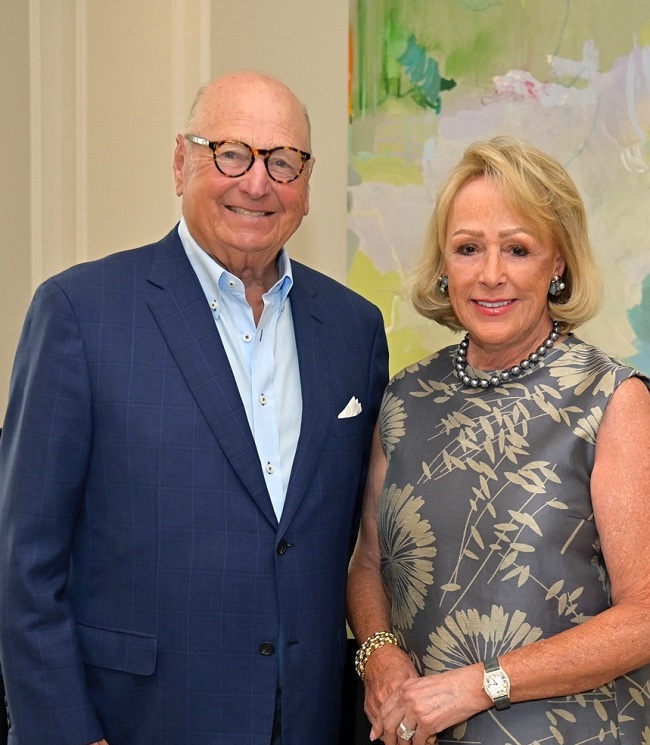A Family’s Investment Is Providing Hope for Others

It was about 2 a.m. when a mother arrived at the Cleveland Clinic Indian River Hospital Emergency Department (ED) with her adult son. She was tearful, trembling and appeared anxious as she ushered her son into the lobby. She reached for his hand, but he pulled it away and glared at her.
In the ED lobby, a psychiatric crisis specialist (PCS) happened to be preregistering a patient for admission to the Behavioral Health Center. She waited to see if there was anything she could do to help. As it turned out, the mother was requesting a psychiatric evaluation for her son and, although he accompanied her to the ED, there was a lot of resistance on his part. “I am not talking to nobody,” he said, over and over. His mother whispered to the PCS, “He needs help,” and then sat down, exhausted.
A Transformational Gift
Growing public awareness about mental health and addiction, along with the shortage of mental health providers and lack of insurance coverage for mental health patients, is driving more and more people to EDs for psychiatric evaluations. Yet many EDs lack the expertise and the appropriate space to manage behavioral issues, which often are disruptive to the general ED operations because of competing priorities.
In 2022, Ron and Nancy Rosner, longtime supporters of Indian River Hospital, made a transformational $10 million multi-year pledge to the hospital to expand community services. A portion of their gift has made a tremendous impact on the Behavioral Health Center, including the creation of the Behavioral Health Zone in the hospital’s ED.
The Rosner’s gift honors the memory of their grandson, Evan, who passed away in 2021 at age 23. The gift is absolutely a tribute to their grandson, but also to the healthcare and emergency services communities in Vero Beach, the couple emphasizes. “We are very fortunate to have all the medical facilities, technology, expertise and treatment we need within a 20-minute drive,” Nancy said in 2023. “A lot of children – and adults, too – need care they can’t afford. We want to help those less fortunate, as we know Evan would have wanted, too.”
Desperate for Help
The PCS sat with the mother and son and offered to answer any questions they may have about evaluations or the intake process. They talked a bit, and she answered some questions for them. The woman explained that soon after his 21st birthday, her son stopped all psychiatric treatment and left the family home. His mother had spent hours searching for him on the streets of Fort Pierce week after week. That night, she found him. With the promise of a hot meal, he agreed to go back home.
After dinner, his mother pleaded with him to go to the ED for an evaluation, hoping he would be admitted to the Behavioral Health Center to stabilize his symptoms and get back on his medications. She remembered very well what she had been taught by his previous psychiatrists: “Schizophrenia means medication for life.”
Addressing the Distinct Needs of Emergency Psychiatric Care
The Behavioral Health Center at Indian River Hospital provides robust inpatient and outpatient services for children, adolescents, adults and seniors. The team of clinicians includes board-certified psychiatrists, experienced RNs, licensed social workers and mental health counselors, and expertly trained mental health technicians. Annually, the Behavioral Health Center sees more than 2,100 individual patients with increased acuity of behavioral health and substance use disorders.
The Behavioral Health Zone (BHZ) is put into operation when the ED has three or more psychiatric patients needing care. It provides a calmer, separated environment for behavioral health patients, distinct from the often chaotic and overwhelming atmosphere of the ED. This not only enhances safety for both hospital staff and other ED patients, it alleviates pressure on acute care beds, addressing a critical space issue within the ED. Separately, the ED has two rooms designed to be safe for psychiatric patients. Each of these rooms can accommodate one patient at a time, while the Behavioral Health Zone can accommodate up to six patients at one time.
Recent data shows compliance with discharge recommendations also is improving for behavioral health patients. This can be attributed to a psychiatric crisis specialist establishing the initial relationship with the patient in the Behavioral Health Zone and the behavioral health care coordinator reaching out within seven days of discharge and providing follow-up assistance.
On the Journey Back to Health
The PCS brought them each a cup of ginger ale. It seemed to ease the tension. Both sat quietly sipping ginger ale and only occasionally looking at each other. The PCS took the opportunity to speak directly to the patient with the hope of motivating him to participate in a psychiatric evaluation. She explained the process in detail and even offered to accompany him and sit with him during the evaluation. The son’s fears and resistance seemed to diminish some and he eventually consented to the evaluation with only one stipulation: “More ginger ale!”
The Behavioral Health and ED Integration team made it happen and, with the help of a psychiatrist, the patient voluntarily signed himself into the Behavioral Health Center for evaluation and treatment. One very tired but relieved mother left the ED that night knowing her son was safe and started on his journey back to health.
A Commitment to Improve Lives
The Rosner’s commitment to and investment in Cleveland Clinic Indian River Hospital has allowed behavioral health care to advance in quantifiable, life-changing ways. Their gift already has improved the lives of many hundreds of people and will continue to have an impact for decades to come.

